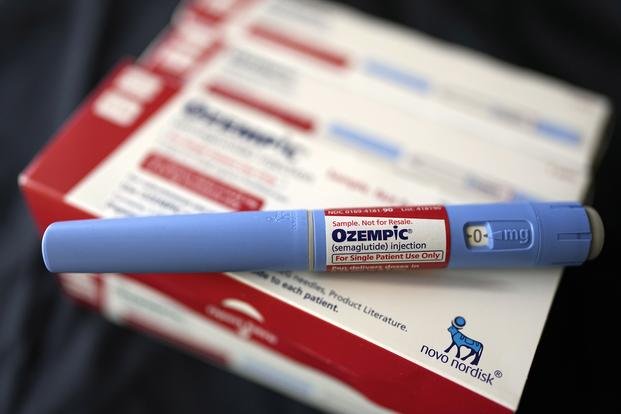When the temperature in North Pole, Alaska, dips below a bone-chilling minus-30 degrees, Brandon Phillips occasionally heads to the front yard with his KitchenAid mixer. To the delight of his kids, the 40-year-old former Army Black Hawk repairman and crew chief takes a heap of local snow and mixes it with cream, milk and sugar for a homemade ice cream.
Phillips once craved sweets like ice cream all the time. But now, after around seven months on Wegovy, an FDA-approved medication for weight loss that has rapidly gained popularity and is derived from the diabetes drug Ozempic, he prefers a single small scoop.
He used to drink more alcohol too, but now, almost 30 pounds lighter and free of what he calls "food noise" that coincided with service-related post-traumatic stress disorder, a single beer is too filling. A vodka soda, heavy on the soda, is plenty.
While the class of drugs that includes Wegovy, semaglutide injections also widely known from the brand Ozempic, has boomed in America, vets looking to start them may be out of luck, according to officials. The meteoric popularity of the drugs has triggered an ongoing global manufacturing shortage.

"Currently, the low doses of Wegovy that are needed to titrate the patient to a therapeutic dose safely are not consistently available from the manufacturer," said VA Press Secretary Terrence Hayes in an email to Military.com. "The manufacturer has no estimate for when the supply constraints will be resolved."
Prescription rates for semaglutide within the Department of Veterans Affairs have nearly doubled annually since 2019, when more than 106,000 prescriptions were filled, according to new data released to Military.com in response to Freedom of Information Act requests. In 2023, that number was just under 1.6 million. Those numbers include both Wegovy and Ozempic.
But last fall, the number of new patients taking the drugs plummeted. Between September and November 2023, no vets were prescribed Wegovy starter doses at most VA facilities, and the total was under 10 in other areas, according to the data received by Military.com.
"I have patients that are coming to me now that definitely meet criteria, but I have no medication to give them," said Dr. Jennifer Clemente, a VA clinical pharmacy specialist based in Detroit. For the time being, Clemente can only refer patients to the VA's MOVE! program for healthy lifestyle habits, already a prerequisite for a VA Wegovy prescription.
Still a relatively new class of drugs being studied intensely, semaglutide dosages are titrated, or slowly increased, to help offset side effects such as nausea, Clemente said. Side effects are serious enough that some patients must stop the drugs altogether, which can in turn lead to more weight gained. Long-term effects, both positive and negative, will take years to come into focus as hundreds of thousands of Americans begin what could be a lifetime of medication.
For those who have started taking the drug and responded positively, like Phillips, the results can be life altering.
"The impact on patients' health has been remarkable, and the impact on their own personal perspectives, their mental health, their body image, can also be quite remarkable," said endocrinologist Dr. Paul Conlin, who also serves as the chief of medical service for the VA Boston health care system.
It's leading to a rush on the drug, with the effect hitting both the VA's budget and the drug supply chain.
The VA spent just shy of $300 million on semaglutide medications in 2023, according to Hayes, ahead of the ongoing global semaglutide shortage from Danish manufacturer Novo Nordisk, which says it plans to increase production of Wegovy starter doses soon. More than three-quarters of the veterans served by the VA are either overweight or obese.
Thus far, the shortages haven't hit patients already taking the drug, according to Clemente, but the VA is holding off on starting new patients on the regimen until doctors can be sure the supply will be consistent.
The shortage has prompted some vets to find other means of getting the drugs, including paying out-of-pocket for compound pharmacies to recreate the drugs from scratch. The FDA has cautioned that some compound pharmacies have used a salt-based semaglutide, which isn't the same active ingredient used in Ozempic and Wegovy, and even issued separate warnings on counterfeit Ozempic that began to flood the supply chain last year.
When vets have turned to the VA for the medications, at times it has been a fight.
"[The VA's] first inclination is to deny expensive stuff," said Jonathan Turner, 56, a Gulf War veteran based in Reno, Nevada. "And then you have to appeal it."
Turner sought out an endocrinologist, beyond his primary care physician, to help make his case for a semaglutide prescription.
The endocrinologist navigated the appeal process with Turner after the VA first denied the doctor's request for semaglutide for Turner in 2022 -- twice. It's an expensive drug regimen, one that can cost patients without insurance roughly $1,000 per month, and insurers expect the drugs costs to rise.
To date, Turner says he's lost 60 pounds, and his fatty liver disease has improved. He suspects he developed the disease because of exposure to toxic chemicals during the Gulf War, including oil field fires and harsh solvents used to clean the electronics he was in charge of repairing.
Non-alcoholic fatty liver disease may be more prevalent in Gulf War veterans, according to developing research.
At least one state government ceased paying for semaglutide because of unforeseen enormous costs. North Carolina recently nixed covering the drug for employees after the medication for 25,000 state employees topped $100 million.
Obesity itself isn't a service-connected disability, meaning veterans can't receive compensation for it. But the VA does treat it as a secondary condition. That includes Vietnam veterans who may have been exposed to Agent Orange, or vets who suffered joint damage from the physical demands of military service.
After more than a year on semaglutide, Turner reached the maximum dose and expects to continue taking that dose for many years. So does Phillips. Neither Turner nor Phillips have run into Wegovy shortage issues, since the larger doses remained readily available.
Turner likened taking Wegovy maintenance dosage to the common practice of taking medication for decades for other chronic conditions, like high blood pressure. "At this point, I'm taking it to try and keep the weight off," Turner said. "You lose the benefits when you stop taking it."













